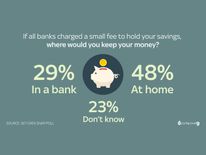The Bank of England (BOE) shocked markets on Thursday, which helped push up gold prices. BOE Governor Mark Carney announced that the key lending rate would be cut by a quarter of a percentage point to 0.25 percent and the central bank’s bond-buying program would be revived. The news came out of no where, and perhaps put a damper on any odds of a rate hike by the Federal Reserve this year.
What was the possible reason for the rate cut and another round of quantitative easing (QE)? The potential reason could be because Britons are hoarding cash at the fastest pace since 2009.
According to a report from Sky News, more people in Great Britain are keeping cash out of the banking system. Due to the historically low interest rates, Britons are keeping nearly $7 billion of banknotes and coins out of financial institutions and leaving them under the mattress.
In fact, the rate of households and businesses building up their holdings of cash increased more than eight percent per year. This is the first time since the height of the economic collapse in 2009.
Here is what the news outlet is reporting:
“Sky News has also found that the proportion of UK banknotes circulating outside the banking system – in people’s pockets, stored at home and outside the country – has now hit the highest level since 1979, as a percentage of GDP.
“The sharp increase in the amount of notes and coins outside the banking system is likely to sound an alarm for economists, some of whom have warned that with interest rates at record lows, there is diminishing incentive for consumers to leave their money in bank accounts, prompting them to hoard their money at home.
“However, Bank officials said that the rise in recent weeks could also be down to increased demand from foreign holidaymakers taking out banknotes to take advantage of the post-referendum fall in the exchange rate.”
Interestingly enough, there has been growing demand for £50 notes because of the uncertainty surrounding their future supply. Carney announced in June that the central bank would not introduce a plastic version of the £50 banknote. This had some suggesting that the BOE would restrict the future supply of the £50 notes or cash in general in order to establish subzero interest rates.
Remember, there are already calls in the United Kingdom to scrap the £50 note. Peter Sands, the former chief executive of Standard Chartered who advises the British government, has argued in favor of getting rid of the £50 note in order to combat criminals and stop tax evasion.
Here is what Sands wrote in his Harvard Kennedy school paper entitled “Making it Harder for the Bad Guys.
“High-denomination notes are arguably an anachronism in a modern economy given the availability and effectiveness of electronic payment alternatives. They play little role in the functioning of the legitimate economy, yet a crucial role in the underground economy. The irony is that they are provided to criminals by the state.”
“Ask people in the United Kingdom when they last used a £50 note, the highest sterling denomination, and the most common answer is to pay a builder or plumber. The incentive is tax evasion, since payment in cash makes it easier for the individual to avoid VAT of 20%; and if the builder pays his workers in cash, he in turn avoids employment taxes and they avoid income tax.”

It is getting scary out there for depositors, savers and investors.
Leave a Comment